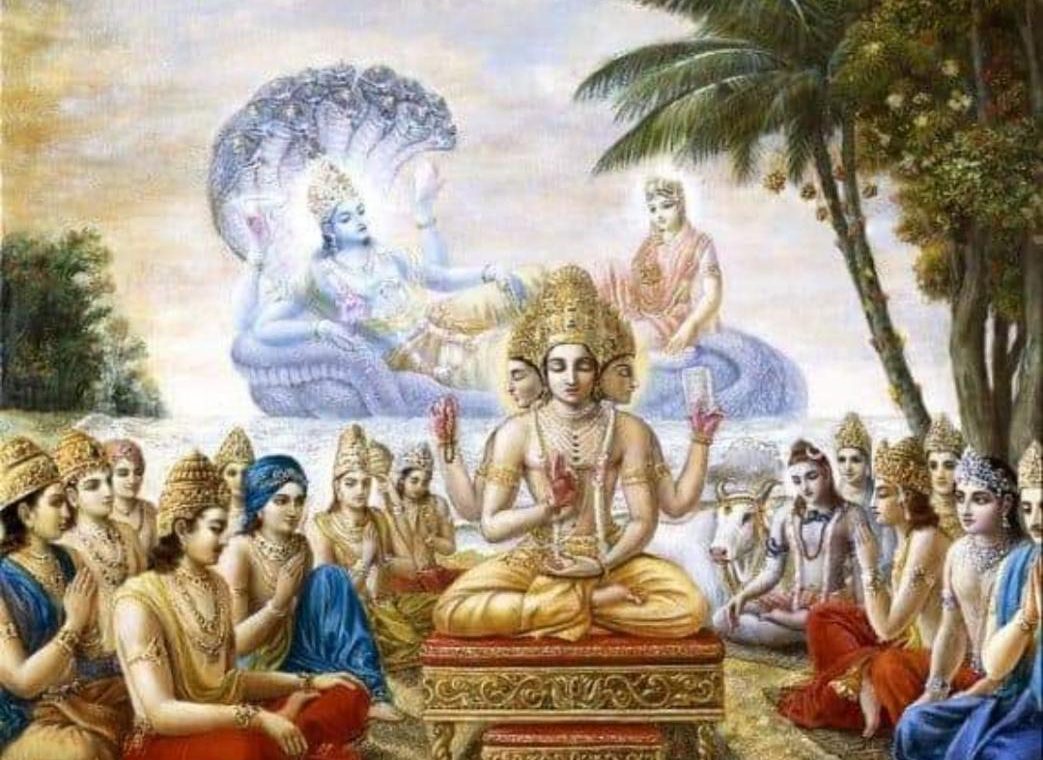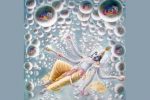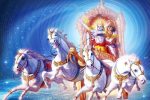NAME 89
Prajābhavaḥ प्रजाभवः
Prajā refers to the subjects of a kingdom. Universe is the God’s kingdom. Bhavaḥ means creation.
He is the cause of creation. The Divine has two aspects; one is the cause and the other is effect. Brahman is the cause and His power of projection known as māyā is the effect. The one who understands that both are the same is jīvanmukta.
Kṛṣṇa says (Bhagavad Gita X.6) that the entire world has originated from His Will. Ultimately, it is the will of the Brahman that is responsible not only for creation but also for sustenance and absorption of the universe.
Prajaabhavah – The One from whom all beings originated
As Adi Sankara says ‘Sarvaah Prajaah Yatsakaashaad Udbhavanti sa Prajaabhavah – The One from all beings have originated’.
The previous Nama embraces all objects but here Prajaa only refers to living objects and in particular the higher forms of life with consciousness developed within.
BG 6.40:
श्रीभगवानुवाच |
पार्थ नैवेह नामुत्र विनाशस्तस्य विद्यते |
न हि कल्याणकृत्कश्चिद्दुर्गतिं तात गच्छति || 40||
śhrī bhagavān uvācha
pārtha naiveha nāmutra vināśhas tasya vidyate
na hi kalyāṇa-kṛit kaśhchid durgatiṁ tāta gachchhati
BG 6.40: The Supreme Lord said: O Parth, One who engages on the spiritual path does not meet with destruction either in this world or the world to come. My dear friend, one who strives for God-realization is never overcome by evil.
The word Tāta is a word of endearment, which literally means “son.” By addressing Arjun as Tāta in this verse, Shree Krishna is demonstrating his affection for him. The son is affectionately addressed as Tāta. The Guru is like a father to his disciple, and hence the Guru too sometimes affectionately addresses the disciple as Tāta. Here, by displaying his affection and grace toward Arjun, Shree Krishna wishes to indicate that God takes care of those who tread on his path. They are dear to God because they engage in the most auspicious kind of activity, and “the doer of good never comes to grief.” This verse asserts that God preserves the devotee both in this world and the world hereafter. This pronouncement is a great assurance to all spiritual aspirants. Shree Krishna then goes on to explain how God preserves the efforts of the yogi who does not complete the journey in the present life.
८९. ॐ प्रजाभवाय नमः |
89. OM Prajābhavāya Namaḥ
Prajaabhavah -He from whom all living creatures (Prajaa) spring forth (Bhava) is known as Prajaabhavah.
Sarvāḥ prajā yatsakāśādudbhavaṃti prajābhavaḥ / सर्वाः प्रजा यत्सकाशादुद्भवंति प्रजाभवः He from whom all beings have originated.
Prajabhavah
One from whom all beings have originated. He from whom all living creatures (Praja) spring forth (Bhava) is known as Prajabhavah. While normal evolution starts with primitive forms and evolves to higher forms, Bhagavan deiced to create the higher forms such as Brahma first, and then the forms that are not as accomplished, such as all the animals, the humans, etc., later.
Bhagavad Gītā – Chapter 10
Ahaṃ sarvasya prabhavo mattaḥ sarvaṃ pravartate,
Iti matvā bhajante māṃ budhā bhāvasamanvitāḥ. (8)
:: भगवद् गीता – विभूति योग ::
अहं सर्वस्य प्रभवो मत्तः सर्वं प्रवर्तते ।
इति मत्वा भजन्ते मां बुधा भावसमन्विताः ॥ ८ ॥
I am the Source of everything; from Me all creation emerges. Realizing thus, the wise ones, filled with fervor, adore Me.
INTERPRETATION GUIDED BY SANT VANI (WORDS OF SAINTS)
Prajābhavaḥ
The source of all beings.
The ‘source’ of all beings. From whom they come and to whom they must go. He from whom all living creatures (Prajā) spring forth (Bhavaḥ). (Śaṅkara) The abode of the Prajās. (Parāsara Battar).
He is Prajābhava because all the prajas are born from Him. He is the source of all beings. All the jīvas are born with different bodies. What is the basis for this difference? According to our own karmas, we have different bodies, parentage, and also different place and time of birth and different horoscopes (sometimes experienced as horrorscopes). Because of this understanding that has been nurtured in this culture, that we are responsible for our own karma we could have been the most proactive people on earth. Unfortunately, acceptance of the situations I am currently in, is taken as resignation. If karma is understood correctly, there is no reason in my life to blame anybody, to hold somebody entirely responsible for the outcome of any situation – neither others nor myself.
In the middle of the night, the wife woke up the quietly sleeping husband and slapped him. The husband exclaimed, “I am not responsible for what I did in your dream”. Likewise we have no idea what we have done in our previous lifetimes, to blame ourselves for the unpleasant situations one finds oneself in. We do not know what the people around us have done in their previous lifetimes and this lifetime to be how they are today and really worthy of blame. Yes, both me and the people around me have played contributory roles in the situations that we find ourselves in today. Oh, if nobody is to be blamed, then what is to be done?
One takes responsibility for one’s life without being a victim of one’s circumstances, seeks clarity in priorities and does what needs to be done in line with dharma. One continues to be prayerful and seeks punya as well. Which karma of which lifetime fructifies in this lifetime, we will never know. Despite being exposed to past life regression therapy, we don’t need to now the muck of the past, if we live a proactive, prayerful life.
As the law of karma alone, Īśvara helps all the jīvas assume different bodies, in different worlds.
We have to hold responsibility of how we feel and everything that happens in our lives without blaming someone else for what has transpired. This may sound unreasonable but the truth is nothing in this world happens without a cause and the seed of that causal effect may have at some point been sown by us to learn our soul lessons, ascend and walk towards our Higher Self rather than falling prey to a repetitive cause and effect cycle.
“May I suggest that if the fabric of revenge has swaddled your heart, you may as well stop praying and meditating. For, such spiritual acts have no effect on a mind smothered by vengeance. You have to let go.
We are ever-transforming, ever-changing, all one has to do to reach the pinnacle of self-realization is to take every step towards positive transformation, towards goodness. You will not regret it.” – Om Swami
Well then the mind would ask should you suffer and accept everything while the other continues to be unreasonable, hurtful and exploitative? Swami says: “You must speak up, protect yourself, and not suffer in silence. But, not with the feelings of revenge. Not with a sense of relief at the pain and suffering of the other person. For, that only means you are not progressing spiritually.”
It doesn’t matter what kind of ill-will one might have for another, nor does the universe care how we justify our actions and words. What eventually matters is that life comes full circle. Such is the order of things.
PLEASE READ
The Lord is the womb for the entire viśva and He himself is the retas, the seed. Starting from Brahmāji to a blade of grass, the Lord has created this variegated universe of beings.
This name seems similar to earlier names that have appeared in previous strings of the Viṣṇu Sahasranāma but the difference here is in the context – as a ‘gateway-name‘ name at the end of this verse it confirms, reiterates, and assures what all the previous names in the string : Sureśa–Śaraṇaṃ–Śarma–Viśvaretāḥ refer to that Viṣṇu who is the supreme master and final refuge of all beings in the Universe and the ‘seed’ from which all life has sprung forth – and it is from him that all the Prajā have emanated/sprung forth and he is indeed the right person in whom we should take refuge. (To read about what ‘gateway-names‘ mean refer to my post on Name 74- Īśvarah.)
Further, this name is an indication of how difficult it is to attain to that abode of Viṣṇu. One can take multiple births, travel and live in the many planes and worlds of existence – even go up to Brahma-lokā but one still cannot break out of the birth-death-birth cycle. It requires what Sri Aurobindo calls the fulfillment of the “double-condition of the soul” – which involves a release from the material and then a sublimation in the eternal.
—-Quote
Release from the mortality of the ego and the body into the spiritual and eternal, — knowledge first of one’s timeless immutable self and union through it with the timeless Godhead, but knowledge too of that which lives behind the riddle of cosmos, the Godhead in all existences and their workings. Thus only can we aspire through the offering of all our nature and being to a living union with the One who has become in Time and Space all that is. Here is the place of bhakti in the scheme of the Yoga of an integral self-liberation.
—-Unquote
Bhagavan in the Bhagavad-gītā says precisely this:
आब्रह्मभुवनाल्लोका: पुनरावर्तिनोऽर्जुन |
मामुपेत्य तु कौन्तेय पुनर्जन्म न विद्यते || 16||
ā-brahma-bhuvanāl lokāḥ punar āvartino ’rjuna
mām upetya tu kaunteya punar janma na vidyate
The cycle of birth-death-birth is the law even if one reaches Brahma-lokā. It is only on attaining to my abode that you are freed from this cycle of birth-death-birth.
There is a puranic-story of the squashing of Indra’s ego which is relevant here:
Viśvakarma, the celestial architect, was engaged in building a huge palace for Indra the King of the Devās that never seemed to be ending – Indra was coming up with more and more changes. Exhausted, Viśvakarma prayed to Nārayana for help who appeared there and asked Indra “Such a huge palace! How many Viśvakarmas have you engaged in its construction?” Indra was shocked and he responded, “I thought there was only one Viśvakarma.” Nārayana smiled and said, “You know of only this Universe with its fourteen realms, I am however the master of the Multiverse – there are as many Universes as there are Indra’s and Vishwakarmas. I have placed one Indra and one Viśvakarma in each Universe!”
Then Indra saw a long line of ants marching towards Nārayana. Indra pointed to the long line of ants and asked Nārayana “Who are these ants and why are they marching towards you?” Nārayana replied “These are all old Indra’s now born as ants and I have called them back to my abode now!” Indra was stunned and speechless.
Then he saw an old Rishi walking with a straw mat on his head. On his chest was a circle of hair with a few strands missing. Indra called out to the Rishi and asked him “Who are you and why is there that strange gap in the circle of hair on your chest. The Rishi calmly replied “I have been granted the boon of chirāyu and I have seen many Indras come and go. The missing strands on my chest are representative of one Indra’s lifespan. At the end of each Indra’s lifespan, one hair-strand falls off and soon I too will join those Indras when all the hair on my chest falls. I think life is short and ephemeral and that is why I refused my disciples offer of building a house for me. This mat I put on my head when it is hot during the day and when it is night, I spread it on the ground and go to sleep.” Indra stood there white-faced and realized the futility of the palace he was building and asked Viśvakarma to go…
“Since we are here, on this planet, with a certain lifespan at our disposal, we may as well live gracefully. Why not carve your own path of happiness based on what all you are blessed with?
Everything you have ever earned, everyone you’ve ever known will one day be separated from you. It is only prudent, therefore, to value what you have. For nothing is forever (diamonds come pretty close though). Let’s live and honor this life for what it is — a blessing.” – Om Swami
PLEASE READ



